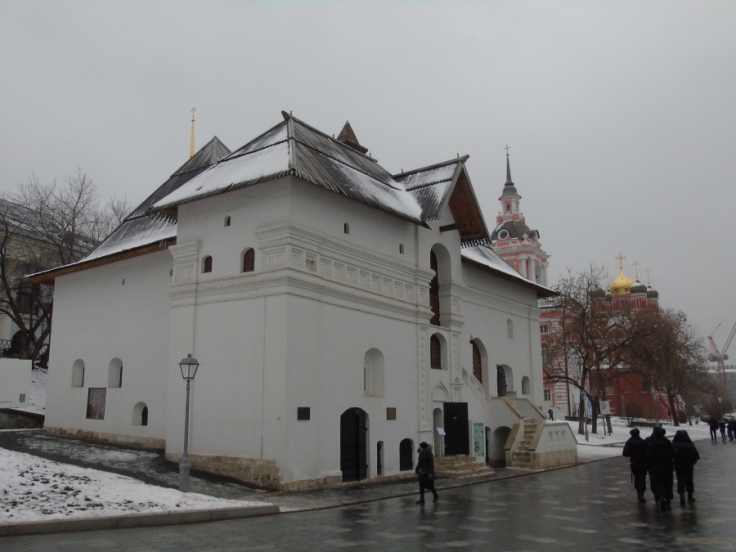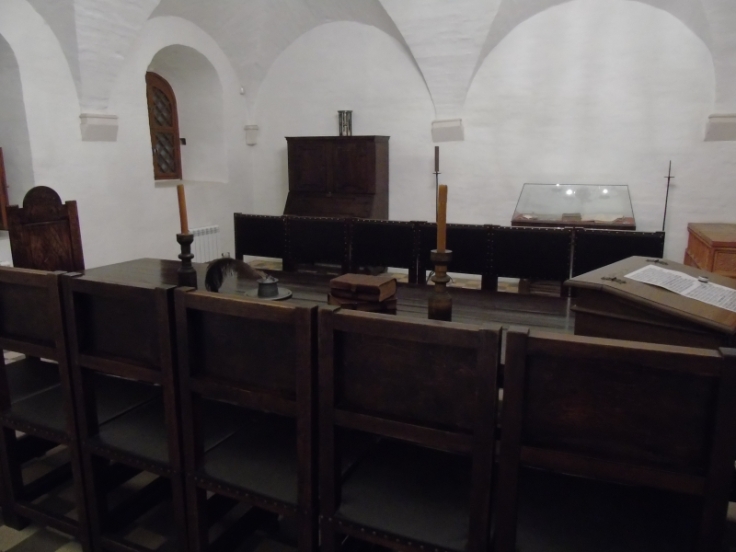Today I paid a visit to the Old English Court (Старый английский двор) in Moscow, located near Red Square in and adjacent to the new Zaryadye Park. This white brick building was given by Tsar Ivan IV (Ivan the Terrible) to merchants of the English Muscovy Company to carry their trade in Russia. This post tells the story of how Anglo-Russian relations first came about.

There is no doubt that Anglo-Saxon England knew about the Kievan Rus’, from where the Russian state has its origins. Indeed, one of Grand Duke Vladimir II (Monomakh) of Kiev’s several wives was Gytha of Wessex, the daughter of King Harold Godwinsson of England. However, at this point the Rus’ was still considered a Viking state with Scandinavian characteristics. Following the Mongol invasion, it seems as though knowledge of the eastern Rus’ principalities, including Moscow, was difficult to come by.
The circumstances under which English merchants first came to the Grand Duchy of Moscow were somewhat accidental. In 1553 King Edward VI of England sent three ships on an expedition to China, sailing around Norway in an attempt to locate a fabled northeastern passage to the Orient. The commander of the expedition was a courtier named Sir Hugh Willoughby, a distinguished nobleman without any navigation experience Willoughby’s second-in-command was Richard Chancellor, a man of learning and an experienced seaman.

Of the three ships sent by King Edward, only one arrived safely. While Willoughby’s crew managed to reach the Kola Peninsula in the Murmansk region, adverse weather conditions prevented them from going further and they were obliged to stay on land. Unaccustomed to the cold weather and without much supplies, the crew of two ships perished in the dark Russian winter.
Chancellor’s vessel, the Edward Bonadventura, was separated from the other two by a storm, but eventually reached the White Sea and landed close to what is now the port of Archangelsk. After being received by locals, Chancellor headed towards Moscow on 23 November. On the way he was intercepted by an envoy of Tsar Ivan IV (Ivan the Terrible) carrying an invitation to the capital city. Having been tasked with an expedition to China, Chancellor was now journeying for hundreds of miles in the capacity of an ambassador, representing England at the Russian tsar’s court. The Tsar had recently conquered the Tatar khanates of Kazan and Astrakhan and made a vassal of the Khan of Sibir (i.e. Siberia). Ivan was intent on expanding Russia’s commercial opportunities and was keen to display Russia’s wealth to the unexpected visitor.
The tsar’s court made an impression on Chancellor, who described Ivan thus: “The [Grand] Duke [of Muscovy] is Lord and Emperor of many countries and his power is marvellous great.” Chancellor reported that Russia was a land of great abundance. When Chancellor returned to England in 1554 he carried with him a letter from Ivan addressed to King Edward, agreeing to the establishment of trading relations. By this point Edward was dead and succeeded by his half-sister Queen Mary. The new queen duly established the Muscovy Company, which was given a special privilege to trade with Russia.

Chancellor made a second trip to Russia in 1555, but was shipwrecked on the return journey and perished. Chancellor died at the age of 35 and could have accomplished much more for the further development Anglo-Russian relations. Nevertheless, through his efforts a lucrative trade was established between the two countries. In 1556 Tsar Ivan granted the building now known as the Old English Court to the Muscovy Company, and this was the base from which English merchants operated for almost a century. The location was ideal. Located in the Zaryadye (literally ‘beyond the [trading] rows’) region of Moscow, the building was close to the centre of trade in early modern Moscow.
The Anglo-Russian trading relationship increased in significance as both powers became key players in the European stage. During the final years of his life, Ivan the Terrible considered an alliance with England in order to strengthen his hand in the Livonian War. Engaged in battle with Catholic Poland, Ivan hoped that Queen Elizabeth I’s Protestant England would send a military force to the Baltic. Ivan hoped that ‘the whale and the bear’ in alliance could gain hegemony over the European continent. The Tsar even offered marriage to the Virgin Queen. This alliance did not come to pass. It was not in England’s interest to send troops to a region of limited strategic importance.

Anglo-Russian political and economic relations have fluctuated wildly since Chancellor first disembarked in Archangelsk. In 1649, Tsar Alexei Mikhailovich broke off diplomatic and commercial relations with England after hearing of the execution of King Charles I following Royalist defeat in the English Civil War. Official relations between the two states were only restored after Charles II was restored to the throne.
Although relations continued to be tumultuous in the 18th century, the fact that Russia gained a foothold in the Baltic meant that Chancellor’s route to Archangel was replaced by a safer one to St Petersburg. English dependence on the Russian trade prevented war on more than one occasion, as the masts of British warships had to be made from strong Russian timbers. From Russia’s perspective, trade with England was just as vital. When Napoleon forced Russia to stop trading with Britain with the Peace of Tilsit in 1807, this caused great discontent among much of the court in St Petersburg. Tsar Alexander I was obliged to recommence the trade illicitly, but this was discovered by Napoleon. One of the reasons for Napoleon’s fateful invasion of Russia was due to Russia’s inability to stop trading with England.
For more information about the circumstances of Richard Chancellor’s voyage to Russia, please visit my article for The Russian Student.

Leave a comment